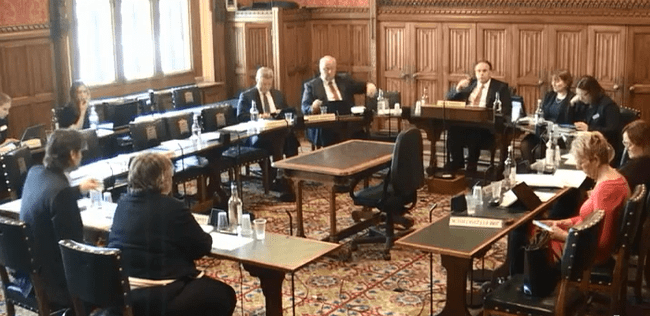Resources minister Therese Coffey appears to have ruled out mandatory measures to force councils to separately collect food waste, when questioned on the issue by MPs yesterday (19 April).
And, the minister has also emphasised the importance of voluntary measures to encourage businesses to reduce food waste and report on their progress in doing so.

(l-r) Resources minister Therese Coffey and Chris Preston deputy director of waste at Defra at the Efra Committee hearing
Dr Coffey gave evidence at the Environment Food and Rural Affairs Committee hearing into food waste in Westminster yesterday. The hearing was originally scheduled for March 22, but was cut short due to the terrorist incident outside the Houses of Parliament in Westminster (see letsrecycle.com story).
In her initial comments Dr Coffey said that she is keen to see councils be ‘more proactive’ in their approach to recycling.
Dr Coffey said: “One of the things I have been interested in doing—of course, yesterday’s events [the announcement of an early General Election] bring it somewhat to a pause at the moment—is to do more to encourage councils to be more proactive in their approaches to how they undertake recycling initiatives. WRAP is doing ongoing work with our officials on elements of that.”
Dr Coffey continued: “I do not think we are at the stage at which we need to be considering mandatory approaches. There are certain rules already in place about separate collections and so on. To go to one extreme, where a household is required to have seven or eight bins, is in my view not appropriate. It feels like using a sledgehammer to crack a nut.”
Urban recycling
Elsewhere Dr Coffey added that the Department was keen to see improvements in recycling rates in major cities and said that improving recycling participation in urban areas such Manchester, Birmingham and London would ‘really help the overall target’.
She said: “We have approached two particular housing landlords in London to see whether we can work with them to pilot new approaches to how to improve the collection of waste, not just because it is social housing, but mainly because it is flats. We are looking at how we make that better.”
The resources minister also acknowledged that retailers play a ‘key role’ in reducing consumer food waste, but she suggested that regulation would not be an effective way to encourage them to do more, and suggested that existing voluntary approaches – such as the Courtauld Commitment – would continue.

Dr Coffey was questioned by MPs on the Efra Committee
Dr Coffey said: “WRAP has done a pretty good job over the years with consumer campaigns, but we have reached a plateau and my strong view is that the experts are the retailers. They know what their customers are buying and how they are using it, and they have more information from that—Sainsbury’s is particularly good in this area, but other supermarkets are improving—about how people prepare and keep food, the top 10 list of foods, which should become more widely available, and what people end up wasting.”
Courtauld
According to the minister, ‘considerable progress’ has been made to influence other supermarkets to step up, with the help of Courtauld. The scheme has a voluntary target to reduce food waste from the grocery supply chain by 20% by 2025.
Dr Coffey was also asked whether the government would look at the possibility of introducing legislation, similar to that in France, which requires all businesses of a certain size to have a policy in place to redistribute food.
She responded: “Like for like, in terms of population and the size of the food industry, we have redistribution on a comparable level—I’m not saying in exact terms of volume, because the food industry in France is a lot bigger than the equivalent in the UK. I think we are already achieving similar outcomes without the need for further regulation.”
The post Coffey rules out mandatory food waste measures appeared first on letsrecycle.com.
Source: letsrecycle.com Waste Managment


